In a speech on April 28, 1939, Adolf Hitler presented the following list of what he felt were his accomplishments.
"...I overcame chaos in Germany, restored order, enormously raised production in all fields of our national economy...I succeeded in completely resettling in useful production those 7 million unemployed who so touched our hearts...I have not only politically united the German nation but also rearmed it militarily, and I have further tried to liquidate that Treaty sheet by sheet whose 448 Articles contain the vilest rape that nations and human beings have ever been expected to submit to. I have restored to the Reich the provinces grabbed from us in 1919; I have led millions of deeply unhappy Germans, who have been snatched away from us, back into the Fatherland; I have restored the thousand year old historical unity of German living space; and I have attempted to accomplish all that without shedding blood and without inflicting the sufferings of war on my people or any other. I have accomplished all this, as one who 21 years ago still an unknown worker and soldier of my people, by my own efforts..."
How accurate is the German Fuehrer's assessment:

1) "I overcame chaos in Germany, restored order..."
On the surface, a defensible statement. But the fact of the matter is that much of the chaos he takes credit for overcoming was the political and terrorist activities of his own party and other political groups, as well as the debilitating labor strikes epidemic at the time. How was this accomplished? By filling concentration camps with those who still mistakenly believed that they retained basic human rights; the right to strike and the right to set prices for ones goods and services in particular. He could quickly solve even the most intractable labor dispute by the simple expedient of jailing anyone who refused the dictates of the German Labor Front. As for political terror, all the leftists were imprisoned while the terror of the right was given state sanction, thus 'order'.

2) "...enormously raised production in all fields of our national economy...I succeeded in completely resettling in useful production those 7 million unemployed who so touched our hearts..."
Almost accurate, though it was closer to 6 million. How was this accomplished? One, by realizing more than most that expansion of the economy was initially more important than monetary stability. Secondly, by placing the brilliant Hjalmar Schacht in a position of authority over the economy. Thirdly, by reaping the benefits of increased employment in rearmament production and vastly increased conscription levels for the military. And lastly, by instituting beneficial public works programs, such as the autobahn, that not only provided work for millions but also improved the infrastructure necessary for modern for economic expansion. As viewed in the spring of 1939, these were real achievements. Hindsight, however, reveals the downside. While the Autobahn was indeed a model for progressive public works, it was sold to Germany’s conservative elite with emphasis on the military advantages; improved volume and flexibility during mobilization and alternate runways for aircraft; options built into the system from its conception. Indeed, on Hitler’s insistence the German economy was, to all intents and purposes, a war economy financed in the short term by financial wizardry (mefo bills). Schacht had fallen out with Hitler in 1937 on this very issue, retaining his Presidency of the Reichsbank but losing any influence on policy. By 1939, the short-term paper was coming due and only continuing assimilation and conquest could fuel long-term growth.
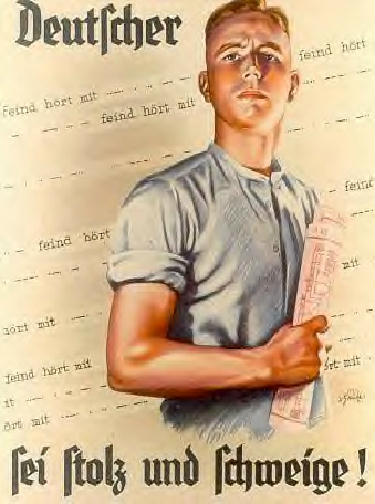
3) "I have not only politically united the German nation..."
He had an incredibly high approval rating with the German people in 1939, some 90 some percent. Even considering the advantages a police state can have in boosting poll numbers the fact is that Hitler was charismatic and popular, even during times when his Party was out of favor with the Volk.
4) "...but also rearmed it militarily..."
True again, though the work had been started under his predecessors. Hitler’s greatest personal accomplishment in this area was the creation of armored divisions and tank armies: A brilliant piece of innovation that, combined with rearmament and increased conscription, temporarily made Germany the strongest nation in Europe, if not the world. The situation Germany found itself in due to Versailles (more below) became something of an advantage due to the fact that Germany was forced to create an armored ground army, a navy and an airforce from scratch. There is nothing like fielding a state of the art war machine.

5) "I have further tried to liquidate that Treaty sheet by sheet whose 448 Articles contain the vilest rape that nations and human beings have ever been expected to submit to."
This is almost modest. Hitler had made it one of his major political goals to eradicate the ‘Dictate,’ and all its effects. By the time of this speech, the hated Treaty could have been toilet paper for all it was worth, and Hitler could take full credit. For a nationalist-minded German, Hitler had granted their hearts desire: A Greater Germany incorporating the majority of Central Europe’s ethnic Germans. As for Hitler’s characterization of Versailles as 'the vilest rape that nations and human beings have ever been expected to submit to,’ it was actually less severe than the Treaty foisted on Russia in World War One by the Germans. Obviously, Hitler would ultimately far surpass in cruelty the provisions of any treaty that one can recall in his treatment of the nations he conquered, as well as Nazi behavior toward the humanity within Germanys own borders.

6) "I have restored to the Reich the provinces grabbed from us in 1919; I have led millions of deeply unhappy Germans, who have been snatched away from us, back into the Fatherland..."
The Rhineland, Saar, Austria, Sudetenland, etc. A case could be made for each of these bloodless requisitions, if it had only stopped there.
7) "...and I have attempted to accomplish all that without shedding blood and without inflicting the sufferings of war on my people or any other..."
In politics, timing is everything. If Adolf Hitler had died after the conclusion of the speech in question, he would most likely be remembered today as one of the greatest leaders Germany ever experienced. Had he caught his boot on the edge of a misplaced swastika while dismounting the podium and died of a broken skull on the Reichstag floor, that particular swastika would be the political equivalent of the True Cross to the average German.
8) "I have accomplished all this, as one who 21 years ago still an unknown worker and soldier of my people, by my own efforts..."
Soldier, yes, but Hitler never was a 'worker': He abhorred physical labor as beneath him. The 'by my own efforts' is certainly the line of a man who is quite full of himself, but who could deny that he had made some real achievements and had, indeed, risen from obscurity to become one of the most powerful men in the world? Unfortunately, after this pre-war high point, the use he will make of the concrete fruits of these achievements will bring about the total and abject defeat of Germany, reducing that once proud nation to slave status.
And all by his own efforts.

Hitler's qualities as a War Leader will subsequently prove insufficient to gain for him a positive historical judgment. While he may have been a brilliant warlord in many respects, he was often a victim of his own hubris and fatalistic impatience. Here is a partial list of Hitler's major wartime boners.
1) Hitler's misconceptions concerning the causes of Germanys collapse in WW1 greatly influenced his decisions as warlord. His belief that Germany would not have been defeated had the war continued had no basis in reality. The German cause was lost. The 'lessons' he learned from WW1 were all the wrong ones. What he always refereed to as the 'stab in the back' was no such thing. When Germany surrendered it was for the purely pragmatic reason of survival. Why allow your enemies to occupy and ravage your country? That would make little sense unless your desire is for your country to pay the price for failure, as Hitler's was in the end. His little dictatorial feelings were hurt because Germany let him down so he allowed them to fall into the hands of their enemies while committing suicide to escape sharing the fate he forced upon them.
2) On the eve of Hitler's attack on Poland, Europe lay at his feet. Germany was in a position to dominate the continent for decades to come. Hitler's maneuvering up until this point was brilliant; a work of genius. He had seceded in eliminating the unfair effects of the Versailles Treaty with the acquiescence (and even active support at times) of the other leading world powers. That would have been the ideal time to make peace, something that Hitler did not desire. Had their been a statesman ruling Germany at that point, we would now be discussing the 61st anniversary of the Pax Germana, for Germany was in a position of power the Kaiser would have dismembered himself to achieve.
3) If Hitler's real purpose had been to eliminate Bolshevism, what better way than to unite Europe under German hegemony forming a power block that could have been superior to Russia's? Instead of making peace with the conquered nations, Hitler (to varying degrees depending on specifics) exploited them for slave labor and murdered their Jewish population. This caused partisan bands to form forcing German units away from the front. Better treatment of the conquered nations could have created allies to strengthen the battle against communism instead of enemies behind the front lines.

4) Hitler's cynical non aggression treaty with Soviet Russia (besides the Jews his greatest enemies) was the epitome of greed driven stupidity. To join with them in defeating the only thing standing between Germany and the communists, Poland, was folly of the worst sort.
5) Hitler grossly miscalculated British and French resolve to draw the line on Poland. They'd clearly given him fair warning that aggression against Poland would mean war, but Hitler underestimated them, a fatal mistake.
6) Hitler's declaration of war on The United States was another fatal miscalculation. Hitler pooh pooh'd reports of the incredible productive capability of America as 'impossible'.
It seems to me that if Adolf Hitler were alive today he would be embarrassed by the continual posthumous whining of his so-called followers citing the fact that he 'missed it by that much' and blaming the superior strength of his enemies (as though the fact that he picked a fight with a stronger opponent is no proof of lack of enlightened leadership abilities). His followers miss the point and insult what he felt was the ultimate nobility of his own character by becoming apologists.
Hitler was a gambler with a penchant for letting it ride. It was a central philosophy of his to go for broke, cross every Rubicon, burn every bridge and admit no thought of defeat or surrender.
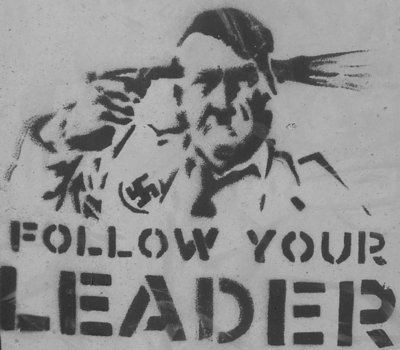
Hitler did indeed 'face the whole world', but he was the one who picked the fight and he was entirely prepared to face the consequences of his actions in a manner he felt was honorable and above reproach: Suicide. To Hitler's way of thinking, this was a noble and heroic act, the antithesis of which would be anything construed as surrender. He gambled and lost. Unfortunately, at some point he decided that if Germany proved to be less than able to fill the role of Master Nation Hitler had in mind for it, she too, as a nation, should take the honorable path and destruct rather than submit.
I believe it is safe to say that Hitler, who indeed was a greatly beloved leader for a period of years, by this act alienated forever the majority of common Germans who, though many may have appreciated the positive side of Hitler's rule, nonetheless were not prepared to commit suicide rather than pragmatically make the best possible peace so as to be able to gather strength and live to fight another day. This is what Hitler's predecessors, those he reviled as 'The November Criminals', did for him: Left enough of the nation intact after a disastrous war to enable recovery and even the off chance of another stab at hegemony in Europe. Unfortunately, Hitler was no pragmatist, nor even a realist. Hitler decided to force the issue to an ultimate conclusion: Death to Germanys enemies, or death to Germany. Fortunately, there were a few in the upper leadership who did what they could to salvage some of their nation from Hitler's scorched earth madness, allowing at least a remnant of that once proud nation to survive.
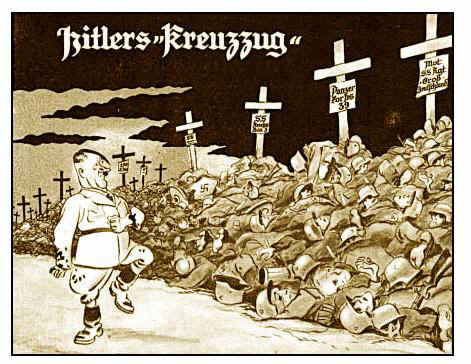
Ultimately, Hitler's worst mistakes were:
a) Formulating policy for a great state on the basis of a bizarre and fallacious worldview,
b) buying into his own press and gambling on his supposed Providence-supplied infallibility to play high-stakes power politics with an insufficient purse, and
c) ensuring the vilification of himself and his ideology by practicing industrial genocide on innocents.
Copyright © 2003-2007 Wally O'Lepp All rights reserved.


"Unhappily I believe in a war with France before long - her vanity, hurt by our victories, will drive her in that direction. Yet, since I do not know of any French or German interest requiring a resort to arms, I do not see it as certain. Only a country's most vital interests justify embarking on war - only its honour, which is not to be confused with so-called prestige. No statesman has a right to begin a war simply because, in his opinion, it is inevitable in a given period of time. If foreign ministers had followed their rulers and military commanders into the field, History would record fewer wars. On the battlefield - and, what is far worse, in the hospitals - I have seen the flower of our youth struck down by wounds and disease. From the window I can see many a cripple hobbling down the Wilhelmstrasse, looking up and thinking to himself if that man up there had not made that wicked war I would be at home strong and well. Such memories and sights would leave me without a moments peace if I thought I had made the war from personal ambition or national vanity...You may rest assured that I shall never advise His Majesty to wage war unless the most vital interests of the Fatherland require it." -Otto von Bismarck, March, 1867



Click to join 3rdReichStudies



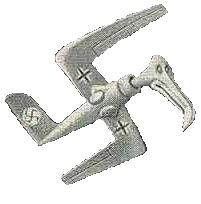
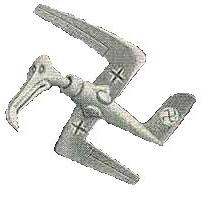


"Tommies and Commies and Jews, oh my!"
FAIR USE NOTICE: This site may contain copyrighted material the use of which has not always been specifically authorized by the copyright owner. We are making such material available in our efforts to advance understanding of historical, political, human rights, economic, democracy, scientific, environmental, and social justice issues, etc. We believe this constitutes a 'fair use' of any such copyrighted material as provided for in section 107 of the US Copyright Law. In accordance with Title 17 U.S.C. Section 107, the material on this site is distributed without profit to those who have expressed a prior interest in receiving the included information for research and educational purposes. If you wish to use copyrighted material from this site for purposes of your own that go beyond 'fair use', you must obtain permission from the copyright owner.



















 "Tommies and Commies and Jews, oh my!"
"Tommies and Commies and Jews, oh my!"